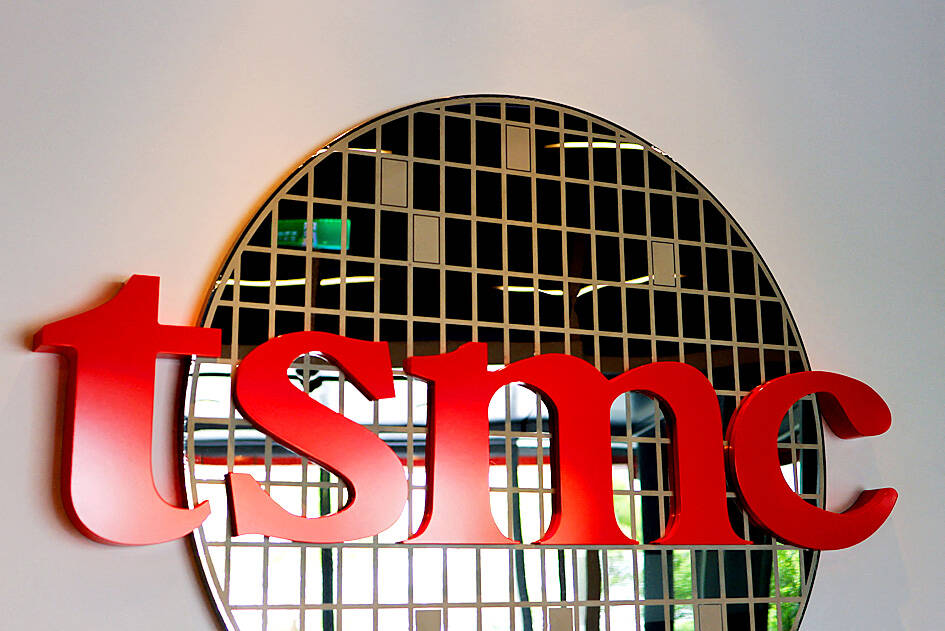The share price gap between Taiwan Semiconductor Manufacturing Co (TSMC, 台積電) and China’s biggest chipmaker is almost at its widest in nearly two decades, highlighting the difficulty Beijing faces in building up its domestic chip industry.
Bolstered partly by state-of-the-art chipmaking capabilities, TSMC has soared 48 percent this year in Taipei while Semiconductor Manufacturing International Corp (SMIC, 中芯國際) lost 7.5 percent, leaving the gap between the two stocks’ annual performance poised to be the biggest since 2005.
The chasm has occurred even as China’s largest semiconductor investment fund, known as Big Fund III, aims to develop the local sector amid US efforts to limit growth.

Photo: Ann Wang, Reuters
Boosting SMIC’s technology “is not something that can be achieved overnight, even with abundant funding,” said Shen Meng (沈萌), a director at Beijing-based investment bank Chanson & Co (香頌資本).
China is capable of making 7-nanometer chips, two generations behind the most sophisticated semiconductors in commercial production, but it is seeking to progress to 5-nanometer chips amid US curbs.
TSMC uses extreme ultraviolet (EUV) lithography equipment to produce more advanced 3-nanometer chips, but such tools cannot be sold to China due to export controls.
“Even if SMIC can produce chips using 5-nanometer technology, the cost would be at least 10 times higher than those produced at TSMC without EUV machines,” Bloomberg Intelligence analyst Charles Shum (沈明) said. “The technology gap isn’t just about reaching a certain level, it’s also about how effectively you can achieve it. ”
Although the Chinese government has unveiled few details on the third vehicle of the National Integrated Circuit Industry Investment Fund, Big Fund III’s formal name, investors are betting it would help solve some sector issues.
“The new fund is expected to focus on advanced technology, including wafer manufacturing, packaging, process control and equipment materials,” said Xiang Xiaotian, a director at Shanghai Chengzhou Investment Management Co (上海誠洲投資管理).
The fund might also target investments in AI chips, said Li Xun (李尋), an investment adviser at Guotai Junan Securities Co (國泰君安證券).

Semiconductor shares in China surged yesterday after Reuters reported the US had ordered chipmaking giant Taiwan Semiconductor Manufacturing Co (TSMC, 台積電) to halt shipments of advanced chips to Chinese customers, which investors believe could accelerate Beijing’s self-reliance efforts. TSMC yesterday started to suspend shipments of certain sophisticated chips to some Chinese clients after receiving a letter from the US Department of Commerce imposing export restrictions on those products, Reuters reported on Sunday, citing an unnamed source. The US imposed export restrictions on TSMC’s 7-nanometer or more advanced designs, Reuters reported. Investors figured that would encourage authorities to support China’s industry and bought shares

TECH WAR CONTINUES: The suspension of TSMC AI chips and GPUs would be a heavy blow to China’s chip designers and would affect its competitive edge Taiwan Semiconductor Manufacturing Co (TSMC, 台積電), the world’s biggest contract chipmaker, is reportedly to halt supply of artificial intelligence (AI) chips and graphics processing units (GPUs) made on 7-nanometer or more advanced process technologies from next week in order to comply with US Department of Commerce rules. TSMC has sent e-mails to its Chinese AI customers, informing them about the suspension starting on Monday, Chinese online news outlet Ijiwei.com (愛集微) reported yesterday. The US Department of Commerce has not formally unveiled further semiconductor measures against China yet. “TSMC does not comment on market rumors. TSMC is a law-abiding company and we are

FLEXIBLE: Taiwan can develop its own ground station equipment, and has highly competitive manufacturers and suppliers with diversified production, the MOEA said The Ministry of Economic Affairs (MOEA) yesterday disputed reports that suppliers to US-based Space Exploration Technologies Corp (SpaceX) had been asked to move production out of Taiwan. Reuters had reported on Tuesday last week that Elon Musk-owned SpaceX had asked their manufacturers to produce outside of Taiwan given geopolitical risks and that at least one Taiwanese supplier had been pushed to relocate production to Vietnam. SpaceX’s requests place a renewed focus on the contentious relationship Musk has had with Taiwan, especially after he said last year that Taiwan is an “integral part” of China, sparking sharp criticism from Taiwanese authorities. The ministry said

US President Joe Biden’s administration is racing to complete CHIPS and Science Act agreements with companies such as Intel Corp and Samsung Electronics Co, aiming to shore up one of its signature initiatives before US president-elect Donald Trump enters the White House. The US Department of Commerce has allocated more than 90 percent of the US$39 billion in grants under the act, a landmark law enacted in 2022 designed to rebuild the domestic chip industry. However, the agency has only announced one binding agreement so far. The next two months would prove critical for more than 20 companies still in the process